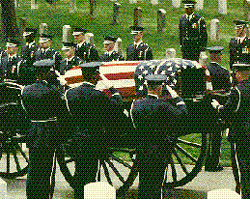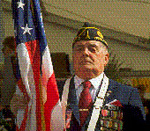 "The rifleman fights without promise of either reward or relief. Behind every river there is another hill, and behind that hill, another river only a wound can offer him the comfort of safety, shelter, and a bed. Those who are left to fight, fight on, evading death, but knowing
that with each day of evasion they have exhausted one more chance for survival…. Unless victory comes, this chase must end in a litter, or the grave."
"The rifleman fights without promise of either reward or relief. Behind every river there is another hill, and behind that hill, another river only a wound can offer him the comfort of safety, shelter, and a bed. Those who are left to fight, fight on, evading death, but knowing
that with each day of evasion they have exhausted one more chance for survival…. Unless victory comes, this chase must end in a litter, or the grave."
Of the estimated 60,000 to 100,000 Allied soldiers who received the Commemorative Medal of the Region from the people of Normandy in 1994, two decided to spend their lives in Alvarado, a small Texas town south of Fort Worth.
The Jubilee celebration in Normandy on June 6, 1994, marked the 50th anniversary of D-Day and officially paid tribute to the sacrifices of the men who liberated the region. Neither Otis Lane nor Sammie Yarber was able to attend the celebration, but each has a case of medals earned on the battlefield. They were both infantrymen, and they both have sharp memories of the litter and the grave.
OTIS' STORY
Otis Lane celebrated his 19th birthday in England in 1944, where he was training with the 29th Infantry Division. The 29th hit the beaches of Normandy in the late afternoon of D-Day, spearheaded the takeover of St. Lo, and was fourth in Allied casualty loss. Lane was a 60-mm mortar squad leader, with three men on the squad. The company moved a quarter mile inland by dark that day.
"We were scared. Everybody was scared. But we knew there was a job to be done," he said. "It was like one general told his people: 'If we've got to die, let's not do it on the beach.'"
After the takeover of St. Lo, Lane's company moved to the British peninsula. As the company transported German prisoners to battalion headquarters, "their own men started firing at them with high-explosive 20-mm." Lane took a piece of shell through his right arm above the wrist. He pulled it out, did his own first aid and kept going. And he earned a Purple Heart. The Bronze Star came later in Belgium, when a machine gun placement was holding down Lane's company. "The mortars have to have mass clearance, so we were always out in the open," he said. "A guy from Dallas and I crawled out into the middle of a field, dragging the mortar and ammunition, and crawled around to the front of an old dead tree. It was white.
"I never will forget it. They could see us, but the machine gun had a traversing bar, and you can't lower the barrel beyond a certain point. While we were out there, he kept shooting at us and cut a line about three feet off the ground across the tree right above our heads. Every time he'd stop firing we'd drop a round in. We finally knocked him out."
Records of both Lane's medals were lost when the battalion records bunker took a direct hit. "For a long time we didn't know who was what grade, or anything like that," he said. "The sad thing was, each of them was five points toward coming home." On another occasion he was reported missing in action when his mortar squad and a rifle patrol – five men – were sent out to scout the exact position of a German battalion.
"We couldn't find them and started back. Early that morning we heard something so we crawled up to the edge of the hedgerow and looked over. The Germans were marching through on the road. We moved back and went to sleep, we were so tired. When we woke up about an hour or so later, they were still coming through. We were supposed to be in that evening but didn't make it until the next afternoon. Every day was a story."
One night Lane was clearing booby traps when "there, in the moonlight, up against a hedgerow, was this German guard."
Lane hit him over the head with his ammunition bag and was surprised to find that "the old boy had been dead about two days. He'd been shot. Still had his rifle up."
On another day a tree burst knocked Lane unconscious, bleeding from the ear. "If it had hit me from the other side, the [blast] concussion would've stopped my heart. Concussion killed a lot of people."
As it was, Lane got a certificate saying he couldn't wear a steel helmet because his neck couldn't support it and was sent into limited duty. He spent over a year in the European theater, taking part in four major battles and once going more than 60 days without a shower. He was let out of the service in 1946 but reenlisted in 1948 and made a career of it. He, and later his wife, Billye, with their four sons, served in Taiwan before coming back to El Paso, where he was assigned to White Sands Proving Ground. He spent two years in the Korean War with the signal corps and received medals for five major battles.
Then he heard about a Hercules missile sit in Alvarado, close to where his family lived. He was stationed in Alvarado with an advance party in 1959 and "we've been here ever since." Lane retired from the military in 1965. "The whole situation [of being at Normandy] never bothered me until the 50th anniversary…. Talking about it now, I'm remembering stuff I haven't thought about in years. Believe me, I was one of the most, most lucky."
SAMMIE'S STORY
 Sammie Yarber and the rest of the 30th Infantry Division hit the beaches six days after D-Day. From the beginning, the 21-year-old had one goal: "Take care of old Sam."
Sammie Yarber and the rest of the 30th Infantry Division hit the beaches six days after D-Day. From the beginning, the 21-year-old had one goal: "Take care of old Sam."
He remembers relieving the company that had held the front line before their arrival.
"Three guys [of an estimated 150] came out," he said. "They were up there by themselves. That's all I ever saw."
They spent the next two months "walking and fighting," cleaning up pockets of German soldiers stranded after extensive Allied bombing in the area. He remembers the gallows humor of finding a dead German in a hedgerow near one camp.
"I called him Fritz. I got tired of looking at him so I put my raincoat over him. I finally told him, 'If you're still here tomorrow, and I'm still here, I'm going to bury you.' We moved out, and I didn't bury him. "I never really slept for about six days after the breakthrough of St. Lo [for which he received a Bronze Star]. I remember digging a foxhole and making a bed, but then we moved out. I think I was in as good a shape as any man who ever lived when I got hit. I carried ammunition for other guys when they'd drop it. I'd pick it up and carry on."
Then, on the first day of August, his best buddy got hit in the shoulder, and Yarber never knew what happened to him. A few hours later, just before dark, the unit was working down the hedgerows when they came upon an old farmhouse with a foxhole nearby. "And that's what got me."
Yarber earned his Purple Heart by taking a rifle grenade in the shoulder. Part of his right ear was blown off, and he was riddled with shrapnel. He remembers being evacuated on a stretcher placed across the hood of a Jeep. The other troops kept having to jump into ditches to avoid shellfire.
"The first couple of times they took me too, but the next time I said y'all go ahead and save yourselves. When I woke up I was under an apple tree getting blood."
He underwent two months of surgery and spent nearly a year in various hospitals. His right shoulder is wired to his body. One rib had to be removed, along with a piece of metal next to his spine, which was removed through his back. His right lung collapsed, and he retained scars over much of his torso. Shrapnel embedded in his neck was brought out through his damaged ear. Then he almost died of pneumonia. Eventually he was sent to a hospital in California to learn to lip-read. To this day he has medical difficulties, including little pieces of metal laying on nerve endings. More little pieces in his head still cause pain. "I went to the doctor and got X-rays like you get for your teeth," he said. "I've got a piece as big as the end of your finger laying right here [under his jaw] and didn't even know it was there. I found this out two months ago."
Yarber said it took five years to heal. His wife, Helen, was a beauty operator and ran beauty colleges to support them and their four daughters. Sammie couldn't get a job because he couldn't pass the physical exams. Finally the government said if he didn't find a job in a year, they'd hire him. He worked for the Veterans Administration for 15 years, with breaks in service for his medical condition. He retired at age 52.
Helen eventually died of cancer, but he stays busy with antiques and working his farm. He never talked about his war experiences until recently. He never watches war movies alone and doesn't watch for more than a few minutes at a time. He gave away his war books. "I know what's in them," he said. "I'm there when I'm reading it."
It took Yarber 49 years to get his medals, but he took them to a recent reunion to show his family. He wants them, including his nine grandchildren, to know. And they're listening. One grandson in Lubbock wrote an award-winning paper at college describing his grandfather, his hero. He also appreciates the recognition from the people of Normandy and the words of the Jubilee address, which he had translated. "When you read the thing, it's like standing at attention," he said. "It's like you're there."
(first printed in Alvarado Star-Bulletin, Alvarado, Texas, on Nov. 13, 1997)
Back to Cry Havoc #32 Table of Contents
Back to Cry Havoc List of Issues
Back to MagWeb Master Magazine List
© Copyright 2000 by David W. Tschanz.
This article appears in MagWeb (Magazine Web) on the Internet World Wide Web. Other military history articles and gaming articles are available at http://www.magweb.com